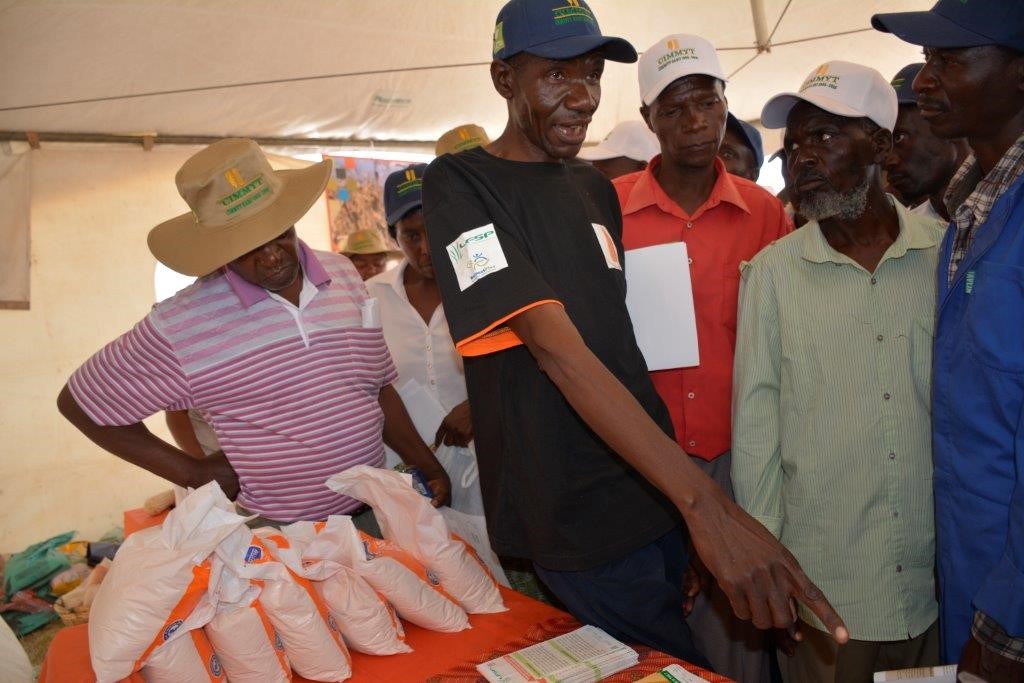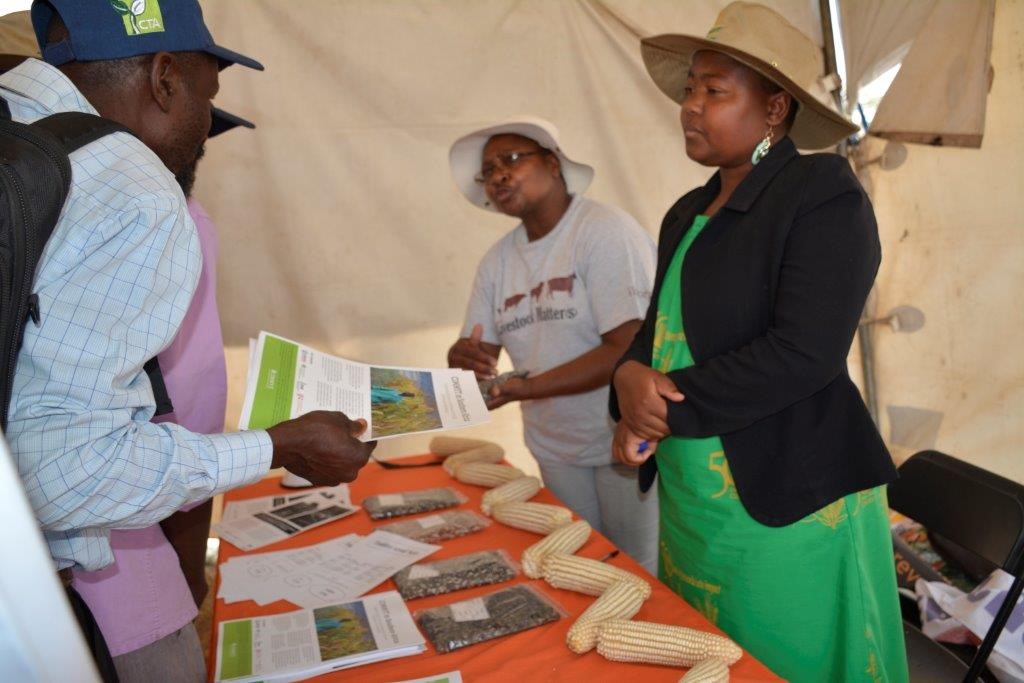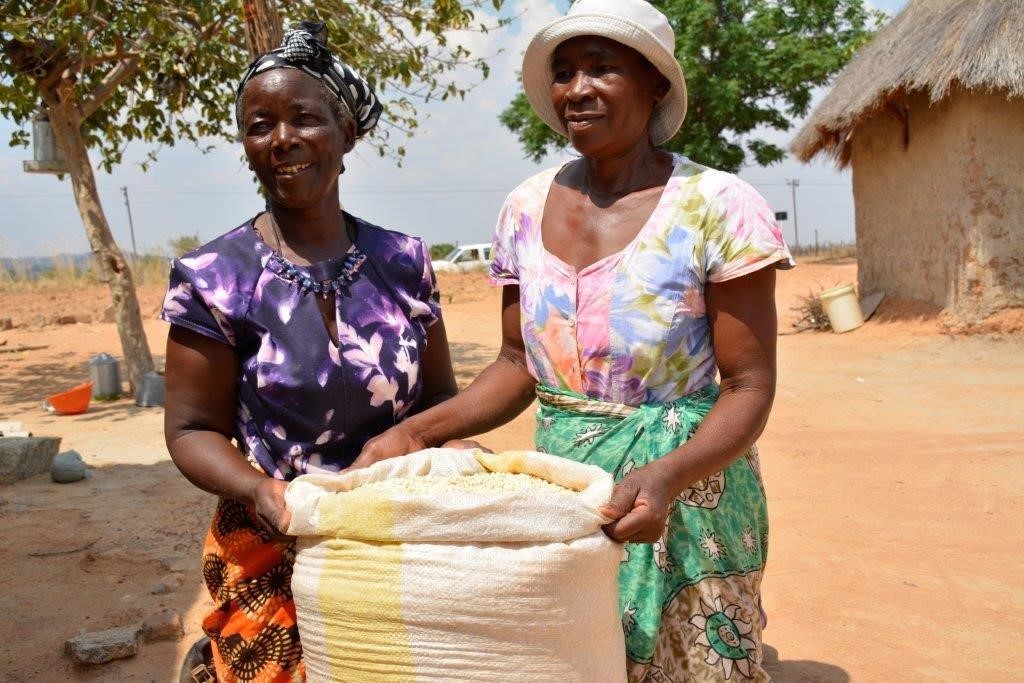
HARARE (CIMMYT) — In its continuing efforts to increase the productivity of maize systems in southern Africa, CIMMYT held seed fairs in two districts of Zimbabwe in September to promote the sharing of information and knowledge about new seed options for farmers and to encourage farmer-to-farmer information exchange.
At the seed fairs, which are like trade fairs, farmers, seed companies, government agencies and non-governmental organizations displayed seed and technological products. The idea of the seed fairs arose out of the problem of suitable dryland crop varieties for the climate in most parts of Zimbabwe.
The main aim of the seed fairs, held in Mutoko and Murewa districts in Mashonaland East Province, was to help smallholder farmers access information that would help them make informed decisions in coping with drought and climate change adaptation. This included awareness on various drought tolerant seeds, and a new variety of nutritious pro-vitamin A maize seed available on the market. Another focus of the seed fairs was to promote good agricultural practices, including sustainable intensification practices such as conservation agriculture.
Funded by the Technical Centre for Agricultural and Rural Cooperation (CTA), the seed fairs were attended by more than 1,400 smallholder farmers from the two districts, eight seed companies, traditional leaders, local government officials, non-governmental organizations and policy makers, as well as CIMMYT’s regional partners from Malawi, South Africa and Zambia. Regional participation is an important component of CIMMYT’s information exchange initiative.
The seed fairs helped establish linkages among farmers, seed companies, researchers, extension agents and agro-dealers. In addition, the seed fairs provided an important avenue for stakeholders to share critical information for informed decision-making at different levels. This has boosted the farmers’ confidence and increased the sense of ownership of their own activities.
“By bringing multiple stakeholders together, the fairs helped stimulate information sharing networks that are beneficial to all stakeholders,” said Peter Setimela, CIMMYT senior seed systems specialist. He added: “Planting wrong seeds lowers harvests and threatens food and nutritional security of the smallholder farmers. In our breeding for stress tolerance, we have tested and evaluated maize varieties from different areas of Zimbabwe under local conditions, incorporated various desirable traits and developed suitable varieties for local climatic conditions.”
Mutoko and Murewa districts were selected as the first beneficiaries of this information dissemination initiative. The fairs sought to build on progress achieved in the CIMMYT on-farm trials conducted in the two districts under a different project – Drought Tolerant Maize for Africa.
Although the main focus was drought tolerant and pro-vitamin A maize, other crop seeds such as finger millet, pearl millet, sorghum, beans, Bambara nuts, pumpkin and ground nut, were also exhibited by farmers.

The farmers were given space to exhibit their own seeds. This was critical in providing an avenue for farmers to exchange seeds that are not marketed through the formal systems but which farmers like. The objective of these demonstrations was to revive local seed varieties, share information on them and acknowledge that these crops thrive in local conditions, and that they could contribute to food and nutritional security.
Mutoko smallholder farmer Anna Chirere, who actively participated in the seed fair, said: “We now know that knowledge is power. So we are going to copy this knowledge from our fellow farmers and seed houses here present.”
CIMMYT plans to make the seed fairs an annual event. This would help the farmers to continue learning from one another and enhance cooperation among the community members. Maize seed on exhibition was drought-tolerant and also included the newly released pro-vitamin A maize that is orange in color, hence the name ‘orange maize’.
In Zimbabwe, nearly one in five children under the age of five is vitamin A deficient. This deficiency can lead to lower IQ, stunting, blindness, increased susceptibility to diseases and higher health risks to mothers – and their infants – during childbirth. According to the World Bank, malnourished children are more likely to drop out of school, and have lower incomes as adults, reducing overall economic growth.
Thokhozile Ndhlela, CIMMYT maize breeder, said many people in rural Zimbabwe cannot afford expensive vitamin A-rich foods such as yellow, orange and red pigmented fruits, dark leafy vegetables, or animal products such as milk, eggs, liver and cheese.
Pro-vitamin A maize, when eaten as a staple, could provide half of the average daily requirement of vitamin A for women and children. In addition to its nutritional benefits, pro-vitamin A maize is bred to yield higher than conventional varieties and is disease resistant and drought tolerant.
Ndhlela said there were 11 varieties of the pro-vitamin A maize in southern African, six of which were already in commercial production in Zambia after a successful launch of an initial three hybrids in 2012.

About The Centre for Agricultural and Rural Cooperation (CTA)
The Technical Centre for Agricultural and Rural Cooperation (CTA) is a joint international institution of the African, Caribbean and Pacific (ACP) Group of States and the European Union (EU). The organization also works with a wide network of ACP-EU public and private sector bodies as well as international organizations around the world. CTA’s mission is to advance food and nutritional security, increase prosperity and support sound natural resource management through information, communication and knowledge management, multi-stakeholder engagement, capacity-building and empowerment of agricultural and rural development organizations and networks in ACP countries.

 Climate adaptation and mitigation
Climate adaptation and mitigation 
